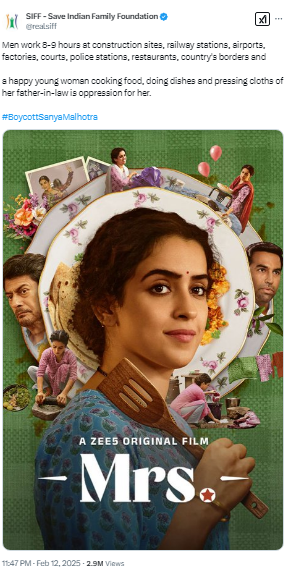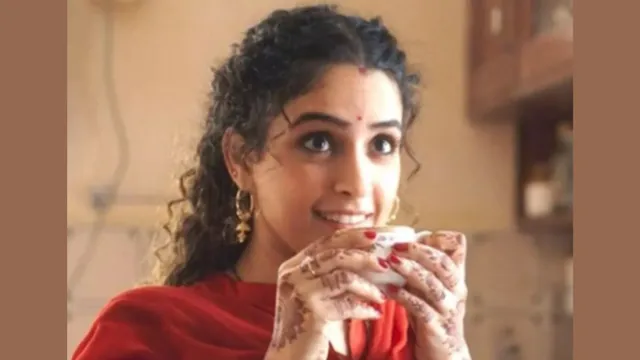- By Srishti Pandey
- Thu, 20 Feb 2025 10:50 PM (IST)
- Source:JND
Filmmaker Arati Kadav has expressed her gratitude for the overwhelming response to her latest film, Mrs., starring Sanya Malhotra. The film has received positive reactions following its OTT release and Sanya’s performance even won her the Best Actress award at the 2024 New York Indian Film Festival (NYIFF). Despite not expecting a festival run, Arati shares that audiences have deeply connected with the film. “People would come up and hug me, talk to me for hours—it was incredible,” she recalls in a conversation with The Hindustan Times.
However, Mrs. has also sparked controversy. The Save Indian Family Foundation (SIFF), a men’s rights organization, accused the film of promoting “toxic feminist propaganda.” Responding to these claims, Arati clarifies, “I don’t believe this is toxic feminism. We didn’t depict men as evil; we showed them as being blind to the protagonist’s struggles. This is a reality many women, including my own mother, have faced. We’ve normalized treating women as ‘functions’ rather than full individuals with dreams and aspirations.”
HAVE A LOOK:

Image: SIFF's viral tweet against Sanya Malhotra's Mrs. Movie (Source: X)
SIFF also criticized the film by arguing that women often associate work with comfortable office spaces rather than labor-intensive jobs. Addressing this, Arati explains, “The difference is that those jobs pay wages. Just because other forms of exploitation exist doesn’t mean we should overlook the struggles women face in their own homes. It’s like saying ‘white lives matter’ to counter ‘black lives matter’—both are important, but they shouldn’t be used to dismiss one another.”
She further discusses how patriarchy affects both men and women, emphasizing that societal expectations burden men as well. “Masculinity is often tied to financial responsibility. If a man chooses to stay at home while the woman works, society questions him. We need to break these stereotypes,” she asserts.
Mrs. is an adaptation of the acclaimed Malayalam film The Great Indian Kitchen (2021). Addressing the challenge of remaking an already well-received film, Arati shares, “The original was widely available, so we had to ensure our adaptation connected with North Indian audiences. It wasn’t a frame-by-frame remake; we wanted to retain the essence while making it more accessible.”
The filmmaker notes that the story felt deeply personal to her, as she saw similar struggles among the women in her own family and social circles. “I met women, even 10 years younger than me, who were going through the same experiences. That made me feel this story was urgent and important to tell.”
Arati also reflects on the impact of social media in shaping conversations about feminism and patriarchy. She is pleased that Mrs. has sparked discussions about invisible labor, something she hoped for but didn’t anticipate on such a large scale. “It’s one thing to talk about these issues, but seeing them brought to life through cinema makes a bigger impact.”
When asked about the pressure of remaking a successful film, Arati admits there were challenges but insists she approached it with sincerity. “I spoke to many women who had lived these experiences and made the story my own. I didn’t overthink it—I just made it honestly and left the rest to God.”
Regarding the rise in remakes and adaptations post-Covid, she observes that the film industry is in a phase of transition. “OTT platforms are figuring out what works, and audiences are also adjusting. At times like this, it’s important to focus on making films sincerely without overanalyzing trends.”

